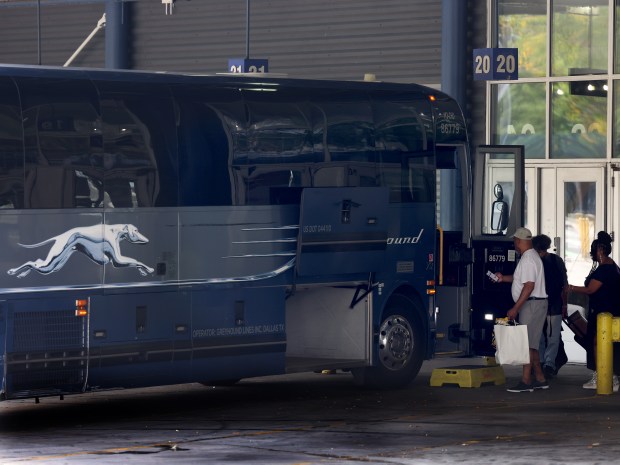The company that owns Greyhound buses is nearing the end of a lease at its downtown station, and that could leave Chicago poised to become the largest city in the Northern Hemisphere without an intercity bus terminal, according to a new report.
Closing the station, especially in a transportation hub like Chicago, would be felt acutely by low-income riders, residents of communities without easy access to train or airline service and others who rely on buses to travel between cities, advocates said. Greyhound and other buses pick up passengers curbside at other sites in Chicago, but mention of giving up the current station building and instead relying more heavily on curbside pickup and drop-off outside Chicago Union Station has been decried by advocates and Amtrak, which owns the train station.
“We are quite concerned about the ripple effects of the loss of this station,” said Joseph Schwieterman, one of the report’s authors and director of the Chaddick Institute for Metropolitan Development. “There’s nothing quite like it in the United States in terms of consequence of taking something this basic out of the system.”
Advocates have sounded alarm bells about the potential for the bus station to close for more than a year. The latest report found Chicago would become the third of the world’s 130 largest cities without a bus terminal, should the current downtown station close with no replacement. The two large cities that currently do not have stations are Kinshasa, in the Democratic Republic of Congo, and Nairobi, Kenya, where temperatures in the winter tend to be warmer than in Chicago.
Losing a bus station would also make Chicago the largest city among those considered the Global North, meaning they have high levels of economic and industrial development, without an intercity bus terminal, the report found.
The future of Chicago’s bus station was thrown into question after a series of sales of Greyhound and its properties. Greyhound’s parent company sold the bus line to German company Flix in 2021, but much of the bus line’s real estate was not part of the sale. The Chicago station is now among those owned by Twenty Lake Holdings, an affiliate of Alden Global Capital, which also owns the Chicago Tribune.
Twenty Lake has hired brokers to seek the sale of the property, which could be redeveloped, according to reporting from commercial real estate information firm CoStar.
The issue has taken on heightened urgency as the lease at the current station is set to expire. The bus operator will likely have to leave the facility Sept. 20 under current circumstances, said Gilda Brewton, an executive with Flix. The lease could also be extended.
Already, Greyhound stations in other cities have been relocated. In some cases, stations were moved miles outside the city center or instead became only curbside pickup and drop-off locations, with no indoor waiting areas.
Advocates, Brewton and Chicago Ald. Carlos Ramirez-Rosa gathered virtually Tuesday to rally against such a solution in Chicago.
The Greyhound station now is used by Flix- and Greyhound-branded buses, as well as bus lines Burlington Trailways and Barons Bus. Some 500,000 passengers traveled through the station last year, according to information shared by the gathered advocates.
About 71% of Flix and Greyhound ridership in Chicago makes less than $35,000 a year, Brewton said. Some riders cannot afford other modes of transportation between cities, others are students, senior citizens or people who choose not to fly, she said.
Micheál Podgers, with transportation advocacy group Better Streets Chicago, said buses are also crucial for people traveling to or from rural communities with few other transportation options. And, as the number of out-of-state abortions in Illinois skyrocketed the year Roe v. Wade was overturned, he suggested it is an important form of transportation for those seeking reproductive and other types of care.
Chicago is a key bus hub where travelers can connect between bus lines, allowing travel to more cities, Schwieterman said. Such connections wouldn’t be possible without a climate-controlled waiting area during layovers, and other cities don’t have the capacity to handle the number of connections that revolve around Chicago, he said.
Though discussions about next steps are continuing with the city and other officials, one possible immediate option will be to move more intercity bus pickup and drop-off to Jackson Street outside Union Station, where Greyhound already has a ticket counter nearby, Brewton said.
That would require cutting bus service, partly because the bus lines would likely not be able to operate there during peak hours, she said.
“We’re not going to operate as many schedules or as much service as we do, but we’ll have a foundation to operate, to take care of our customers,” Brewton said.
Amtrak has pushed back against the suggestion, citing congestion along Jackson Boulevard and crowding at Union Station. Nearby, Canal Street is under construction, making the problem worse until the project is completed, a rail agency spokesman has said.
Chicago Chief Operating Officer John Roberson said in a statement city officials were continuing to talk with Greyhound and Amtrak. The rail agency “has agreed to work in partnership to solve Greyhound’s problem of providing a clean and safe terminal facility for intercity bus passengers,” he said.
“While we have looked at a number of different options, it should be noted that Greyhound has an option to renew its lease at its current Harrison Street location under the same terms and conditions that it currently operates under,” he said.
Ramirez-Rosa, whose 35th Ward does not include the downtown bus station, said the city can play a role in resolving where and how buses can pick up and drop off passengers, including through its regulatory and zoning power.
“Ultimately it is up to the city of Chicago to permit where Flix North America will pick up and drop off in the short term as we work toward a permanent intercity bus terminal,” he said.
Even as its lease expiration approaches, Flix is continuing to push for another, longer-term option. Brewton suggested the city buy a bus station that could be used as a public intercity terminal. She compared it to an airport, where multiple airlines fly in and out of a facility owned by a public agency.
“We continue to believe that the city of Chicago will be best served in the long term through an intermodal transit facility, a solution that will require a collaborative process across stakeholders,” a company spokesman said.




